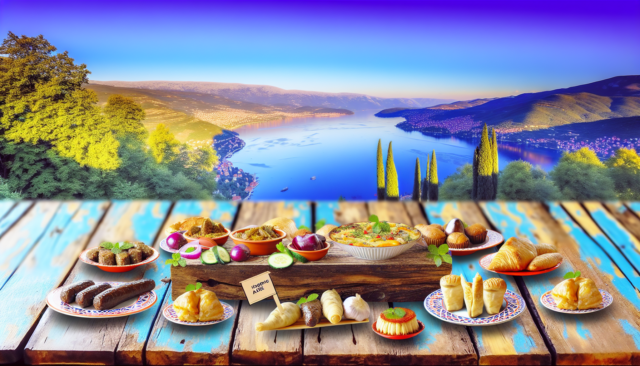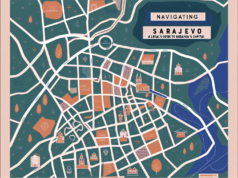
Nestled in the heart of the Balkan Peninsula, Bosnia and Herzegovina is a country rich in cultural diversity, stunning landscapes, and historical legacy. While it often lingers in the shadows of its more touristy neighbors, Bosnia and Herzegovina is gaining recognition as a culinary destination that offers visitors a chance to indulge in a vibrant tapestry of flavors and dishes. From the enchanting capital of Sarajevo to the picturesque town of Mostar, culinary adventures await those willing to explore the unique gastronomy of this remarkable country.
The Influence of Cultural Heritage
Bosnia and Herzegovina’s cuisine is a reflection of its complex history and diverse cultural influences. Ottoman, Austro-Hungarian, and Mediterranean traditions intersect here, resulting in a flavorful melange that showcases local ingredients, traditional cooking methods, and time-honored recipes. This fusion of flavors creates a culinary landscape that is both unique and deeply rooted in the region’s history.
Signature Dishes to Savor
1. Ćevapi
Perhaps the most famous dish from Bosnia and Herzegovina, ćevapi are small, grilled sausages made from a blend of beef and lamb. Often served with somun (a type of flatbread), chopped onions, and a dollop of spicy red pepper paste known as ajvar, these skewers are a must-try for any food lover. Enjoying ćevapi in a local tavern or at a bustling food market will provide an authentic taste of Bosnian hospitality.
2. Burek
This flaky pastry filled with minced meat, vegetables, and spices is another staple of Bosnian cuisine. Burek can be found throughout the country, often served with a dollop of yogurt on the side. Whether it’s prepared in a traditional round shape or as small triangles, a warm piece of burek paired with a cold beverage is a satisfying and hearty meal.
3. Sogan-dolma
Sogan-dolma are stuffed onions filled with a mixture of minced meat and rice, seasoned with a medley of herbs and spices. This comforting dish is typically slow-cooked to allow the flavors to meld, resulting in a delicious and aromatic dish that exemplifies the heartwarming nature of Bosnian home cooking.
4. Pita
Distinct from the traditional Middle Eastern pita bread, Bosnian pita refers to a variety of sweet pies made from thin layers of dough layered with either savory fillings such as pumpkin or sweet fillings like cheese and apple. These lovingly crafted pastries showcase the skill and artistry of local bakers.
5. Baklava
For dessert, the Bosnian version of baklava, a sweet treat made from layers of filo pastry, nuts, and syrup, is a delightful conclusion to any meal. Often cut into diamond or square shapes, a piece of baklava paired with a cup of strong Bosnian coffee provides guests with a blissful taste of tradition.
Beverages of Bosnia
No exploration of Bosnian cuisine would be complete without indulging in its traditional beverages. Bosnian coffee, often served in small cups, is a strong and aromatic experience reminiscent of Turkish coffee. The coffee culture fosters social interaction, and the ritual of brewing and serving coffee often creates a warm and inviting atmosphere in homes and cafes.
In addition to coffee, Bosnia and Herzegovina is home to a burgeoning wine scene. The country’s varied climate, particularly in the Herzegovina region, produces excellent wine, notably the native Žilavka and Blatina grape varieties. Exploring local wineries offers visitors a unique opportunity to sample these exceptional wines while basking in the beautiful surroundings.
Food Markets and Culinary Experiences
For those looking to immerse themselves fully in the culinary traditions of Bosnia and Herzegovina, visiting local food markets is indispensable. Places like Baščaršija in Sarajevo buzz with life and flavor, offering everything from fresh produce to artisanal cheeses. Wandering through these markets allows visitors to connect with local vendors and experience the daily life of Bosnians.
Moreover, culinary workshops are increasingly available, where chefs share their expertise with eager learners. Whether it’s learning to make fresh ćevapi or mastering the art of baklava, participating in these workshops creates lasting memories and a deeper understanding of the cultural significance behind the cuisine.
Conclusion
Exploring the culinary landscape of Bosnia and Herzegovina is an adventure that tantalizes the senses. With its rich history, diverse influences, and a strong emphasis on communal dining, the country invites visitors to savor its vibrant flavors and warm hospitality. Each meal tells a story of tradition, culture, and pride, making the culinary journey through Bosnia and Herzegovina a fulfilling experience for any traveler seeking to understand the essence of this beautiful country. Whether you are dining in a quaint street-side café or enjoying a homemade meal with a local family, the flavors of Bosnia and Herzegovina offer a unique taste of its heart and soul.













